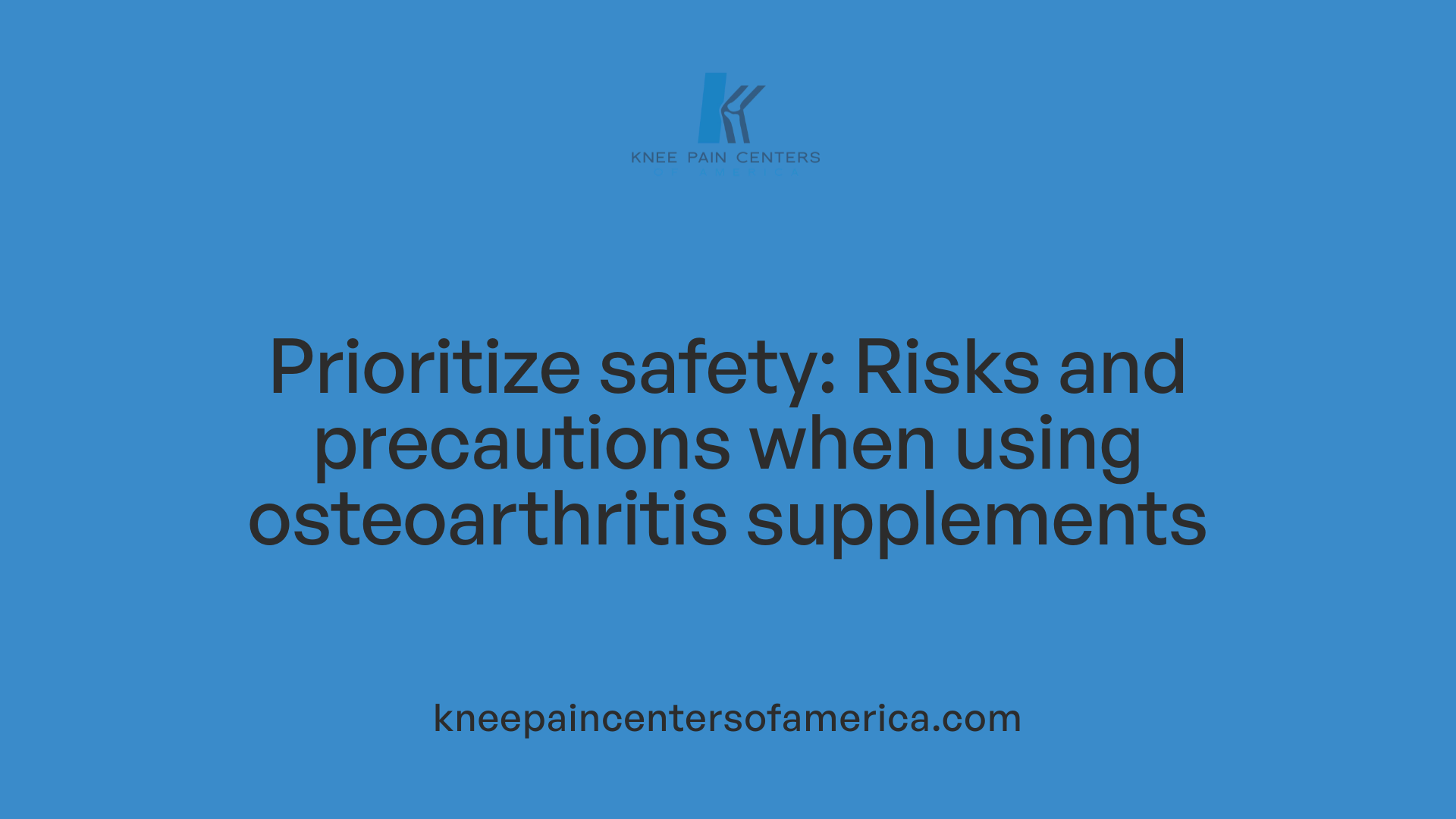Understanding the Role of Supplements in Managing Osteoarthritis Symptoms
Osteoarthritis (OA) is a common joint disorder characterized by cartilage deterioration, leading to pain, stiffness, and decreased mobility. While conventional treatments include pain relievers and physical therapy, many individuals seek alternative approaches such as nutritional supplements. This article explores the scientific evidence behind various supplements purported to alleviate OA symptoms, safety considerations, and guidance for choosing appropriate options.
Omega-3 Fatty Acids and Fish Oil

What are the anti-inflammatory effects of omega-3s?
Omega-3 fatty acids, mainly EPA (eicosapentaenoic acid) and DHA (docosahexaenoic acid), possess potent anti-inflammatory properties. They work by modulating inflammatory processes within the body, which can help reduce joint inflammation that contributes to osteoarthritis symptoms.
How do omega-3s impact joint pain and stiffness?
Several studies suggest that omega-3s can help decrease pain, stiffness, and swelling in joints affected by osteoarthritis. They may be particularly helpful in relieving symptoms, making daily activities easier for those with joint issues.
What are the sources of omega-3 fatty acids?
Omega-3s are naturally abundant in fatty fish such as salmon, mackerel, sardines, and tuna. Plant-based sources include walnuts, flaxseeds, and chia seeds. For convenience, many people take fish oil supplements, which provide a concentrated dose of EPA and DHA.
Natural remedies and lifestyle modifications for osteoarthritis
Managing osteoarthritis often involves more than supplements. Maintaining a healthy weight reduces stress on weight-bearing joints. Gentle, low-impact activities like swimming, walking, or cycling can improve joint function and reduce pain. Applying heat or cold packs can soothe discomfort.
Incorporating anti-inflammatory foods rich in omega-3s, such as fatty fish, walnuts, and flaxseeds, can support joint health. Stress reduction methods like mindfulness, yoga, or tai chi can help manage symptoms. Physical therapy and the use of supportive devices also promote better joint function.
What safety considerations should be kept in mind when taking osteoarthritis supplements?
Before starting any supplements, consulting a healthcare professional is crucial. Fish oil, for instance, can thin the blood, increasing bleeding risk, especially if combined with blood-thinning medications. Quality varies among supplement brands, as they are not regulated as strictly as medications. Being aware of potential side effects and interactions is essential to ensure safe use.
What scientific evidence supports the use of omega-3s in osteoarthritis?
Research indicates that omega-3 fatty acids from fish oil have anti-inflammatory effects that can help reduce symptoms of osteoarthritis. Studies have shown they can decrease joint pain, stiffness, and swelling, with some evidence suggesting they also support overall joint health. While benefits are generally modest, incorporating omega-3-rich foods or supplements is considered a supportive measure alongside other treatments.
Glucosamine and Chondroitin: Building Blocks or Placebo?

What are the common supplements used for osteoarthritis symptom relief?
Many individuals with osteoarthritis turn to nutritional supplements as an adjunct to traditional treatments. The most common supplements include glucosamine, chondroitin, omega-3 fatty acids (found in fish oil), MSM (methylsulfonylmethane), boswellia, curcumin (from turmeric), and avocado/soybean unsaponifiables. These products are popular because they are believed to support joint health, reduce inflammation, and alleviate pain.
However, their effectiveness can vary greatly. For instance, while some organizations like the National Institute for Health and Care Excellence (NICE) do not recommend routine use of glucosamine and chondroitin due to inconclusive evidence, many patients still use them hoping for symptom relief.
What is the scientific evidence supporting the use of supplements like glucosamine and chondroitin sulfate for osteoarthritis?
The scientific findings about glucosamine and chondroitin are mixed. Several studies suggest that these supplements might modestly lower joint pain and improve function, particularly in knee osteoarthritis. For example, some trials report pain relief within several weeks to months of starting therapy.
Conversely, large systematic reviews and meta-analyses often find no significant clinical advantage over placebo. Some research indicates small improvements that might not be meaningful for every patient. Moreover, these supplements have an excellent safety profile but do not conclusively rebuild or repair cartilage.
Thus, while many patients notice benefits, the overall evidence remains inconclusive on their role in altering disease progression.
How can I choose the appropriate supplements for osteoarthritis management?
Choosing the right supplements involves considering the strength of scientific evidence, safety, and personal health conditions. It’s crucial to consult healthcare professionals before initiating any new supplement regimen, as interactions with medications and individual health factors can influence safety.
Quality assurance is vital because supplements are not regulated as strictly as pharmaceuticals. Selecting products from reputable sources can reduce risks of contamination or incorrect labeling.
Among the options, omega-3 fatty acids and certain formulations of curcumin have relatively stronger evidence for reducing inflammation and pain.
Remember, supplements should complement, not replace, conventional treatments like exercise, weight management, and pain medications when necessary.
| Supplement | Evidence Level | Main Benefits | Notes |
|---|---|---|---|
| Glucosamine sulfate | Mixed; some small benefits observed | Pain reduction, joint mobility | Often used for knee OA; safety usually good, interactions possible |
| Chondroitin sulfate | Mixed; small benefits reported | Reduces pain and stiffness | No strong proof of cartilage rebuilding; tends to be well tolerated |
| Omega-3 fatty acids | Moderate, with good dietary support | Decreases inflammation, pain | Found in fish oil, walnuts, flaxseeds; useful especially with diet intake |
| Curcumin | Moderate; modest effects observed | Anti-inflammatory, pain relief | Better absorption with piperine or fats; can be used alongside standard therapies |
| MSM (Methylsulfonylmethane) | Inconclusive; some benefits noted | Support for connective tissue, pain | Used for knee pain and inflammation; evidence still emerging |
| Boswellia serrata | Some positive findings | Reduce inflammation, pain | Usually taken in extract form; larger studies needed |
| Avocado/soybean unsaponifiables (ASU) | Some evidence of benefit | Reduce pain and stiffness | May help reduce NSAID use; more high-quality research needed |
Choosing nutritional supplements for osteoarthritis should be personalized and based on scientific support, safety, and individual response. Always discuss with a healthcare provider before starting any supplement to ensure appropriate and safe use.
The Evidence Landscape: Do Supplements Rebuild Cartilage?
In vitro and animal studies
Research on cartilage repair benefits from laboratory experiments and animal models. Many studies have indicated that components like glucosamine, chondroitin, and collagen can stimulate cartilage cells or chondrocytes, promoting production of collagen and proteoglycans—building blocks of cartilage. However, these promising results in test tubes and animals do not always translate directly to humans.
Human clinical trial results
Human trials investigating these supplements often produce mixed outcomes. Some studies suggest modest pain relief and slight improvements in joint function, especially for glucosamine sulfate and chondroitin sulfate in knee osteoarthritis. For example, a few clinical trials reported reductions in joint stiffness and inflammation after several weeks or months of supplement use.
Yet, large-scale, high-quality randomized trials have not conclusively proven that these supplements rebuild or slow down cartilage destruction long-term. The American College of Rheumatology and other authorities generally advise caution, as the evidence does not strongly support routine use for disease modification.
Limitations and expectations
The current scientific landscape shows limitations such as variability in supplement quality, differing dosages, and short durations of studies. Many trials focus on symptom relief rather than actual cartilage regeneration or disease modification.
While some patients experience symptom improvement, expectations should be realistic. These supplements are more likely to offer mild, short-term relief rather than reversing cartilage damage or preventing disease progression.
Additional insights
In vitro and animal studies offer exciting clues about how these substances might support cartilage health. However, the leap from lab results to effective human treatment remains large. More rigorous, long-term clinical research is needed.
| Type of Study | Main Findings | Limitations | Clinical Significance |
|---|---|---|---|
| In vitro & animal studies | Stimulate cartilage cell activity | Not directly applicable to humans | Promising but unconfirmed in people |
| Human trials | Some pain and stiffness reduction | Variability and small effects | Limited, variable benefits |
Overall, while supplements like UC-II collagen and MSM show potential, the evidence is not yet strong enough to recommend them solely for cartilage rebuilding in osteoarthritis. Addressing symptoms with a comprehensive approach remains the mainstay of treatment.
Safety First: Risks and Cautions with Osteoarthritis Supplements

What safety considerations should be kept in mind when taking osteoarthritis supplements?
It is essential to consult a healthcare professional before starting any new supplement regime for osteoarthritis. This helps assess potential interactions with existing medications, especially blood thinners like warfarin, which can interact with fish oil or glucosamine. Some supplements, such as high-dose fish oil, may thin the blood, increasing bleeding risks. Others, like fat-soluble vitamins, could accumulate to harmful levels if taken excessively.
Side effects are also a concern; for example, turmeric high doses may cause gastrointestinal discomfort, while willow bark can trigger allergies in sensitive individuals. As dietary supplements are not regulated as stringently as medicines by the FDA, the quality, purity, and potency of products can vary significantly.
Are there specific populations that should avoid certain supplements?
Certain groups should exercise extra caution. People on blood-thinning medications should be cautious with fish oil and glucosamine, as these can increase bleeding risk. Individuals with glaucoma or diabetes should consult with healthcare providers before taking supplements like chondroitin or herbal remedies. Pregnant or breastfeeding women, and those with immune system conditions, should also seek medical advice before use.
How can I ensure the quality of supplements I buy?
To minimize risks, always purchase supplements that have undergone third-party testing by reputable organizations, ensuring they meet safety standards. Select products from well-known brands with transparent ingredient lists and clear dosages. Avoid products with unverified claims or ingredients you cannot identify easily.
By taking these precautions, you can help ensure that supplement use supports your osteoarthritis management safely and effectively.
Additional Nutritional Support: Vitamins and Minerals
What vitamins and minerals support osteoarthritis management?
Vitamin D plays a vital role in maintaining strong bones and may contribute to managing osteoarthritis symptoms, especially in individuals who are deficient. Adequate vitamin D levels support calcium absorption and help keep joints and bones healthy.
Vitamins A, C, and E are known for their antioxidant properties. Although these vitamins are essential for overall health, current research does not strongly support their routine supplementation specifically for osteoarthritis. Still, ensuring sufficient intake through a balanced diet is advisable, particularly for those with deficiencies.
Does vitamin D help reduce osteoarthritis pain?
Research indicates that vitamin D deficiency correlates with more severe OA symptoms, but evidence for its direct effect on pain relief remains inconclusive. Supplementing vitamin D in deficient individuals might improve bone health and potentially alleviate some symptoms, but it should not be relied upon solely for pain management.
What dietary patterns are recommended for joint health?
Adopting a diet rich in fruits, vegetables, nuts, and fatty fish can supply anti-inflammatory nutrients that support joint health. These foods provide antioxidants, omega-3 fatty acids, and other beneficial compounds that may reduce systemic inflammation. Conversely, limiting processed foods, sugar, and saturated fats can help minimize inflammation and support overall joint function.
| Nutrient | Primary Role | Dietary Sources | Supplementation Guidance |
|---|---|---|---|
| Vitamin D | Bone strength, inflammation regulation | Fatty fish (salmon, mackerel), fortified dairy, sunlight | Supplement if deficient, consult healthcare provider |
| Vitamin A | Immune function, cell repair | Carrots, sweet potatoes, leafy greens | Usually sufficient through diet |
| Vitamin C | Collagen synthesis, antioxidant | Citrus fruits, peppers, strawberries | Generally adequate in diet, consider supplements if deficient |
| Vitamin E | Antioxidant, cell protection | Nuts, seeds, spinach | Supplementation not routinely recommended without deficiency |
Focusing on nutrient-rich foods and maintaining a balanced diet can contribute significantly to supporting joint health and managing osteoarthritis symptoms effectively.
Complementary and Supportive Therapies

What natural remedies and lifestyle modifications can help manage osteoarthritis pain?
Managing osteoarthritis (OA) symptoms involves several lifestyle strategies. Maintaining a healthy weight is crucial, as excess weight puts additional strain on weight-bearing joints like the knees and hips. Engaging in low-impact exercises, such as swimming, cycling, or walking, helps strengthen the muscles surrounding affected joints, improving stability and reducing pain.
Applying heat or cold therapy can temporarily relieve pain and inflammation. Heat packs relax muscles and increase blood flow, while cold packs help reduce swelling and numb sharp pain. Supportive devices like braces, insoles, or walking aids can provide joint stabilization and lessen discomfort.
Manual therapies, including massage and physiotherapy, also contribute to symptom relief by improving joint mobility and reducing muscle tension. Additionally, incorporating stress-reduction and relaxation techniques can enhance overall well-being, as stress can exacerbate pain perception.
What other non-supplement approaches can assist in OA management?
Beyond supplements, various non-pharmacological treatments are essential in osteoarthritis care. Physical therapy tailored to individual needs helps improve joint function and flexibility. Manual therapies, such as joint mobilization and soft tissue massage, can decrease stiffness and pain.
Assistive devices, including orthotic insoles, walking sticks, or splints, help distribute weight more evenly and reduce joint stress. Weight loss, achieved through diet and exercise, has been shown to significantly decrease joint load, particularly benefiting knee osteoarthritis.
Some patients find benefit with acupuncture and other complementary therapies, which may alleviate pain and improve function for some individuals. These approaches are generally safe and can be used alongside conventional treatments.
How important are lifestyle modifications in conjunction with supplements?
Lifestyle changes are foundational to effective osteoarthritis management. Proper diet, regular low-impact exercise, weight control, and avoiding joint overuse complement any supplement regimen. Combining these strategies with safe, evidence-supported supplements offers the most comprehensive approach.
Implementing these modifications can reduce reliance on medications, slow disease progression, and improve quality of life. Always discuss these strategies with healthcare providers to develop a personalized, safe plan tailored to individual needs and health status.
Conclusion: Integrating Supplements into a Holistic OA Care Plan
Why is it important to consult a healthcare professional before taking supplements?
When considering supplements like glucosamine, chondroitin, omega-3 fatty acids, or turmeric, consulting a healthcare provider is crucial. They can assess your overall health, current medications, and specific needs to recommend safe options. As supplements are not regulated as rigorously as medications, quality and ingredient accuracy can vary.
How can I choose the appropriate supplements for osteoarthritis management?
Select supplements based on current evidence, safety profiles, and personal health conditions. For example, omega-3 fish oil may help reduce joint inflammation, while curcumin shows anti-inflammatory benefits. It’s important to remember that supplements are meant to be adjuncts—not replacements—for other treatments like physical therapy, weight management, and medications.
What are the limitations of supplements in osteoarthritis treatment?
Despite some promising results, supplements generally do not cure osteoarthritis or slow its progression in a significant way. Their efficacy tends to be modest, and outcomes can vary between individuals. They should not replace conventional treatments but can be part of a broader management plan.
Why is a balanced approach to osteoarthritis treatment essential?
Combining lifestyle modifications—such as regular exercise, weight loss, and joint protection—with supplemental treatments provides the best chance for symptom relief. Exercise strengthens muscles around affected joints, reducing pain and improving stability. Weight loss decreases joint load, enhancing overall mobility.
How does lifestyle complement supplement therapy?
Lifestyle changes serve as foundational components that enhance the benefits of supplements. These practices can improve joint function, decrease inflammation, and contribute to better long-term outcomes.
| Aspect | Role | Details |
|---|---|---|
| Medical consultation | Ensures safe, personalized use | Evaluates health status and interactions |
| Supplement choice | Based on evidence and individual needs | E.g., omega-3 for inflammation, curcumin for pain relief |
| Lifestyle management | Synergistic with supplements | Includes exercise, diet, weight control |
| Limitations | Supplements are not cures | May only provide symptom relief |
| Comprehensive care | Combining treatments | Medications, therapies, lifestyle |
This integrated approach maximizes joint health, relieves symptoms, and enhances quality of life, highlighting the importance of personalized, holistic osteoarthritis management.
Empowering Informed Choices for Osteoarthritis Relief
While dietary supplements can play a role in managing osteoarthritis symptoms, their effectiveness varies, and they should be used judiciously under professional supervision. Integrating supplements with lifestyle modifications, physical therapy, and conventional treatments creates a comprehensive approach tailored to individual needs. Always prioritize safety, quality, and evidence-based decisions to optimize joint health and quality of life.
References
- 12 Supplements for Osteoarthritis - Arthritis Foundation
- Popular Supplements for Arthritis: What You Need to Know
- Osteoarthritis - Treatment and support - NHS
- Dietary Supplements for Osteoarthritis - AAFP
- Nutritional Supplements for Osteoarthritis - WebMD
- Using Supplements to Treat Arthritis
- Osteoarthritis - Diagnosis & treatment - Mayo Clinic
- Dietary supplements for treating osteoarthritis: a systematic review ...
- Supplements for osteoarthritis: Types and safety





